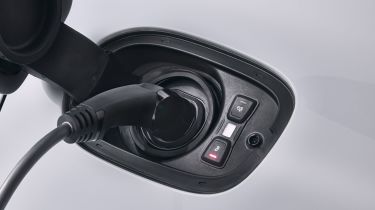Porsche Panamera hybrid range, MPG, CO2 & charging
Figures for the Porsche Panamera hybrid are impressive, but how close you come to achieving them will depend on your driving style
| Fuel economy | CO2 emissions | Electric range | Wallbox charge time |
|---|---|---|---|
| 97-141mpg | 45-66g/km | 31-35 miles | 3hrs (0-100% 7.2kW)* |
*with optional 7.2kW on-board charger
The Panamera hybrid will return very impressive fuel economy if you drive carefully and make sure its battery is kept topped up. Despite the huge performance on offer, the powertrain's willingness to lean on its electrical assistance when it sees fit is good news for economy.
On our test of the 4S E-Hybrid model, the on-board trip computer hit its digital stop at 99mpg, but was probably returning a figure north of 100mpg in mixed driving. Failing to keep the battery topped up, either from a home charger overnight or from public chargers while out and about, will result in fuel-economy figures more akin to the standard V6 and V8-engined petrol Panameras, however – so it's vital that owners do this to make the most of their cars.
Porsche Panamera hybrid range, MPG & CO2 emissions
The entry-level 4 E-Hybrid is unsurprisingly the most efficient offering in the three-strong line-up of plug-in Panamera models, returning up to 141mpg fuel economy and putting out as little as 45g/km CO2 emissions for a pleasingly low company-car Benefit-in-Kind (BiK) rating.
Official fuel-economy figures for the more expensive and powerful 4S E-Hybrid top out at 105mpg. Official electric range is pegged at 31-35 miles. CO2 emissions can be as low as 61 or as high as 69g/km depending on specification and wheel size. For the top-of-the-range Turbo S E-Hybrid variant, numbers aren't that far off the 4S, standing at 95-105mpg fuel economy and 61-69g/km of CO2.
Charge time
The Panamera comes with a 3.6kW on-board charger as standard, along with a selection of charging cables. Charging capacity can be increased to 7.2kW as a cost option, while Type 2 cables are also on the options list. Exact charging times aren't quoted, but according to our calculations the car's 17.9kWh battery should take around five hours to charge fully at 3.6kW, or around three hours at 7.2kW. It'll be much longer to charge via the domestic three-pin cable supplied.
